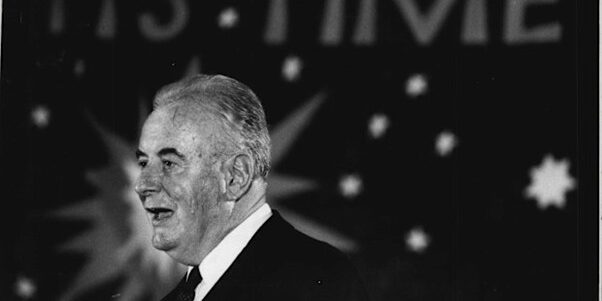
Photo Credit: Bruce Milton Miller.
No one looks great, fifty years after the dismissal of the Whitlam Government.
It is time to freshly analyse that moment free from the bondage of myth.
In October 1975, Opposition Leader Malcolm Fraser struck by using his numbers in the Senate to block supply, the Government’s Budget, Treasurer Bill Hayden’s first. Fraser demanded that Prime Minister Gough Whitlam call an early election, eighteen months before one being due. Whitlam decided to tough it out, hoping to win reluctant support from one or more nervous Senators to break the deadlock.
After the 1974 Double Dissolution, the Senate split 29-29, plus two independents voting with the Coalition. In 1975, Senate numbers strengthened for the Opposition because Queensland Premier Joh Bjelke Petersen and NSW Premier Tom Lewis broke with convention to appoint non-Labor Senators to respectively replace a Labor Senator who had died (Bert Millner) and another appointed to the High Court (Lionel Murphy). Cleaver Bunton, Murphy’s replacement, voted with the government on supply, but Albert Field vowed to vote against, but was on-leave because of a High Court challenge to his eligibility. Labor was ‘one down’, though, without Milliner’s vote.
Both the PM and the Opposition Leader, rolled the dice over a three-week period of tense gamesmanship.
With Whitlam, there was adulation and fear. Supporters placed him on a towering pedestal. Opponents feared inflation, wage breakouts, and industrial-relations turmoil.
Whitlam had vision and a Fabian’s passionate belief in ring-binder politics, the vivid, stubborn conviction that lives can be improved through the power of technocratic solutions. Medibank, free university fees, means-tested school funding, no-fault divorce, independent foreign policy stances, were some hallmarks. But economics was not his forte. Whitlam was like Bradman batting for Dubbo United. Inexperienced, ill-disciplined ministers let the team down.
Fraser acted ostensibly because he believed the chaos of the Whitlam’s government rule, including various ministerial sackings, and the discovery of secret loan negotiation for billions in ‘petro-dollars’ with dodgy characters, notably Pakistani middleman Tirath Khemlani, merited strongarm tactics to force the government to the polls.
But there was another reason Fraser moved. He feared that Whitlam might get his act together. The Labor ministry now included Bill Hayden as Treasurer, and new blood with John Wheeldon, Jim McClelland, Joe Berinson, Joe Riordan, and, last, Paul Keating. The government suddenly had capable ministers at the helm.
Fraser berated the government with masterly menace. Whitlam portrayed the battle as whether the “people’s house” would prevail over a Senate whose composition had been soiled by underhand manoeuvres by conservative states’ Premiers.
The Governor-General, Sir John Kerr, a former Chief Justice of the NSW Supreme Court, brooded over the right course, hoping someone would crack.
Kerr believed that the Governor-General held reserved powers to break any impasse should the House of Representatives and the Senate reach an impossible point of conflict, such as over money supply. But he never counselled or warned his Prime Minister of his thinking. Kerr feared that if he did so then Whitlam would contact Buckingham Palace to have him dismissed.
Kerr sought advice from several High Court judges as to whether his interpretation of the reserve powers was correct, including potentially the dismissal of a serving prime minister.
The Chief Justice, Sir Garfield Barwick, a former senior Menzies-era Liberal Minister, advised him. There is still controversy about what was said. In his 1978 memoirs, Kerr revealed consultation with another High Court Justice, Sir Anthony Mason. The latter, in 2012, pointedly stated that he advised Kerr he should warn his Prime Minister before acting.
Fraser won a huge victory at the election on December 13, 1975.
In the aftermath, at the UNSW ALP Club in early term 1976, Senator Jim McClelland was asked what to make of the botched loan from Iraqi dictator Saddam Hussein’s Ba’ath’s party that Whitlam secretly tried to procure during the election campaign. “Diamond Jim” thought the dismissal had temporarily sent Whitlam mad.
But on one major point, Whitlam was sensible. Keating has colourfully said he would have had Kerr arrested if the Governor-General’s dismissal letter was handed to him as Prime Minister. Luckily, this modern rum rebellion moment never transpired. (You shudder at the implications, and the violence that might have followed.)
In contrast, Whitlam was a constitutional democrat, Burkeian in his immediate instincts to test the will of the people, as well as outraged by the deceit of Kerr. If to hotheads this sounds unexciting, then so do many wise acts.
In 1977, through referendum Fraser restored the convention that state parliaments should fill vacancies with a person from the same political party as the outgoing senator.
The stitching of Australian democracy tore, but was robust enough not to unravel. Fraser never recovered from the circumstances of his instalment. Kerr lived and died in exile. Fraser thought Kerr weak and an embarrassment. Whitlam’s reputation suffered from post-election revelations. Despite his blind-spots, he ranks as one of the most consequential prime ministers.
In sum, on November 11, 1975, the greatness of all the participants traded at a discount. From political bastardry, Australian politics simultaneously became battlefield, theatre, trial, and execution.







